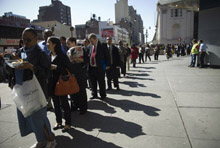
Typical street scene in Santa Ana, El Salvador. (Photo: iStock)
IMF Survey: IMF Sees Unemployment Remaining High in Many Advanced Economies
April 14, 2010
- Recent recession’s jobless dynamics differed across advanced economies
- Study sees high rates of unemployment persisting through 2011
- Standard policy levers remain primary tools to counter unemployment rise
Combating unemployment in the aftermath of the global crisis will remain a policy priority in most advanced economies at least through 2011, according to a new IMF study.

IMF report looks at unemployment in 21 advanced economies during recessions, recoveries over past 30 years (photo: Frances Roberts/Newscom)
WORLD ECONOMIC OUTLOOK
The study, released as part of the IMF’s flagship World Economic Outlook (WEO), says that given the sluggish economic recovery and the lingering effects of the global financial crisis, average unemployment across advanced economies is forecast to remain high through 2011, even though job creation is likely to pick up this year.
“The global economy is recovering from its deepest downturn since World War II, but the speed of recovery differs greatly across regions,” the study, published on April 14 as Chapter 3 of the WEO, says.
“For many advanced economies—where the financial crisis was centered—recovery is expected to be slow. In this context, persisting high unemployment may be the key policy challenge facing these economies as recovery gains traction.”
Differing impact
During the Great Recession of 2008/09, output and unemployment responses differed markedly across advanced economies. For example, in Ireland and Spain the unemployment rate increased by about 7½ percentage points, despite the fact that output dropped by more than 8 percent in Ireland but by only half as much in Spain. Moreover, although Germany suffered an output drop of about 7 percent, the unemployment rate actually decreased during its recession.
To shed light on this and near-term prospects, the chapter provides a systematic analysis of unemployment developments for a sample of 21 advanced economies during recessions and recoveries over the past 30 years.
Overall, the analysis presages sluggish employment growth during the recovery. Beyond the potentially slow recovery in output, the nature of the recent recession—financial crises combined with house price busts—in several advanced economies weigh against unemployment moderating any time soon. Indeed, based on the current path of policies, the forecasts presented suggest that although employment growth will turn positive in many advanced economies in 2010, the unemployment rate will remain high through 2011.
Ways of countering unemployment
Given the potential for high short-term unemployment to become entrenched over the medium term, combating unemployment is a key policy challenge. The standard macroeconomic policy levers—monetary policy and fiscal policy—remain the primary tools for boosting employment through their impact on economic activity. Financial sector repair is also essential, given that labor-intensive sectors rely heavily on bank credit.
Several specific labor market policies could help reduce unemployment, in addition to generally encouraging wage flexibility and improving labor market institutions.
For economies with lingering macroeconomic uncertainty, but where labor productivity remains strong, targeted and temporary hiring subsidies may help advance employment creation. Evidence suggests that the success of these schemes depends on how well they are targeted, designed, and enforced.
In countries with large short-time work programs, phasing them out as the economy recovers combined with carefully designed wage-loss insurance programs could help facilitate movement of labor across sectors.
Finally, in countries with two-tier labor markets—where employment protection legislation is strict for permanent contracts and the share of temporary workers is high—transitioning to a system of open-ended labor contracts under which employment security gradually increases with tenure could help reduce the negative impact of temporary employment contracts on human capital formation and the lack of unemployment benefit coverage for such workers.


